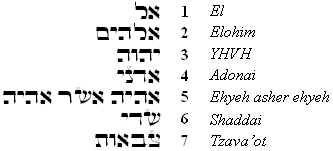|
It is permitted to erase names like Jeremiah, Isaiah, or Zechariah, even though the last letters of such names spell out the Name YAH, since the entire name is considered a single word. Nevertheless, it is customary to abbreviate such names, leaving out the final Hey, to avoid the chance that a divine Name may be desecrated:

Likewise it is customary to write Yehudah (Judah) with a final Aleph rather than a final Hey, lest the Dalet is left out and the Name Y-H-V-H is inadvertently written:

It is customary to write the Hebrew number 15 as Tet-Vav rather than Yod-Hey, which is the divine Name YAH. Similarly, 16 is written as Tet-Zayin rather than as Yod-Vav, which resembles a divine name (e.g., YOchanan).

Note that these changes are made even when they are part of a larger number such as 115, 416, etc.
There is also a rather superstitious custom of transposing the letters of numbers which might otherwise spell out a word with a negative connotation, such as in the case of 270 (Resh-Ayin, which means "evil") or 304 (Shin-Dalet, which spells the word for "demon"):

Finally, since holy books containing the Name(s) of God are not to be destroyed, discarded books or scrolls that contain any of the Names of God are put in a genizah, or "cemetery" for sacred writings (usually a storeroom in a synagogue).
|




